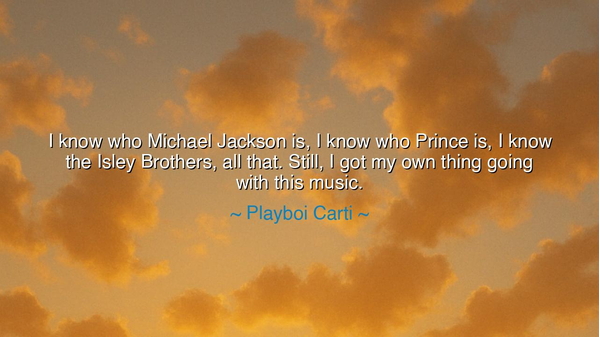
I know who Michael Jackson is, I know who Prince is, I know the
I know who Michael Jackson is, I know who Prince is, I know the Isley Brothers, all that. Still, I got my own thing going with this music.






Hear the words of Playboi Carti, a voice of the new age, who declared: “I know who Michael Jackson is, I know who Prince is, I know the Isley Brothers, all that. Still, I got my own thing going with this music.” In these words lies the ancient struggle between homage and originality, between honoring the masters who came before and daring to carve one’s own path. He does not deny the greatness of legends—he names them, reveres them, acknowledges their thrones. Yet he proclaims boldly: their crowns are not his. He has his own thing, a voice, a sound, a vision that is his alone.
The ancients too knew this balance. The sculptors of Greece studied the statues of their forebears, yet they reached for perfection in new proportions. The philosophers of Rome revered Plato and Aristotle, yet Seneca and Marcus Aurelius found their own wisdom, suited for their age. In every generation, the disciple must become more than a shadow of the master. To merely imitate is to remain a child; to honor while transcending is to become an heir. Carti’s declaration is not arrogance—it is the eternal call of the artist to be unique, even in the presence of giants.
Consider the story of Pablo Picasso. He knew well the works of Michelangelo, of Velázquez, of the great painters of tradition. He learned their strokes, their craft, their genius. Yet he shattered convention with Cubism, declaring to the world that he must follow his own vision, however strange, however misunderstood. For to know the past is wise, but to remain chained to it is slavery. Picasso’s path mirrors Carti’s: reverence for the legends, yet the courage to stand apart, with “his own thing” guiding his hand.
Carti’s words also reveal a deeper truth about music itself. Michael Jackson, Prince, and the Isley Brothers are not simply names but pillars, monuments of sound that shaped eras. Yet their greatness lay in the very thing Carti claims for himself—they, too, had their “own thing.” Jackson redefined performance, Prince blurred boundaries of genre and identity, the Isleys fused gospel, funk, and soul into something wholly theirs. To follow their example is not to copy them, but to imitate their courage in being singular.
The teaching is clear: greatness is not found in repeating the voices of others but in finding one’s own. To be influenced is natural, but to be consumed by influence is to lose your soul. Every artist, every dreamer, must declare at some point: I honor those before me, but I must walk my own road. This is the fire of originality, the courage that keeps the river of creation flowing through the ages. Without it, art would stagnate; with it, each generation breathes fresh life into the eternal song.
Practical wisdom follows: learn from those who came before you, but do not remain bound by their example. Study their craft, their discipline, their genius—but then turn inward, and ask: What is my own thing? What is the sound, the vision, the truth that only I can bring? Be unafraid to be misunderstood, unafraid to clash with tradition, unafraid even to fail. For failure in originality is greater than success in imitation.
So let the words of Playboi Carti echo as teaching for all: “I know the legends. Still, I got my own thing.” Let us honor the past, but let us not worship it to the point of paralysis. Let us take the torch handed down by the giants, and not hold it in their name alone, but let it light our own way forward. For the truest homage to the masters is not to repeat their songs, but to add our own verse to the eternal music of humanity.






AAdministratorAdministrator
Welcome, honored guests. Please leave a comment, we will respond soon